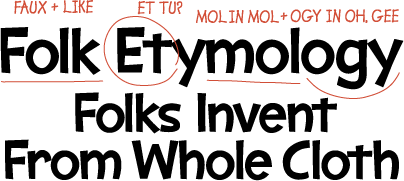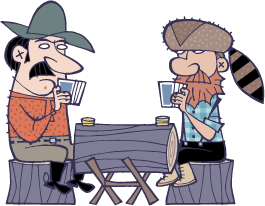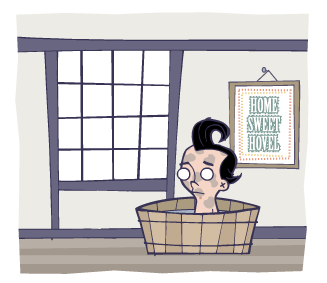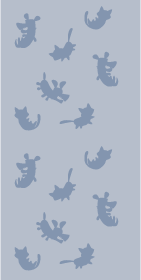

We don’t know the origin of every word and phrase we use, leading some to intuit (invent) derivations playing fast and loose with seeming connections or similarities to other words or phrases. This is the pulling-it-out-of-your-arse school of research. Also known as folk etymology. Proper etymology relies on original sources, ye olde written material. Confirming oral histories can be a mare’s nest since we don’t have working time machines to go back and hear folks chew the fat in days of yore.
Folk etymologies are colorful tales that tickle our fancy* and so we’d like them to be true. We’re happy as a clam with an entertaining falsehood and by and large unhappy with the boring truth. Which may explain politics as much as the popularity of folk etymologies.


We start with this old chestnut claiming the word buck, a dollar, derived from “pass the buck”, which itself has a questionable backstory. The story goes 19th century poker players kept track of whose turn it was to deal with a token called a buck since it was commonly a buck knife. When the time came to change dealers he “passed the buck” to the next guy.
While this makes a nice story, it’s a load of codswallop. Notice no money was called a buck, it was a token designating the dealer. One is left at sixes and sevens how passing a buck knife designating the dealer got to mean a dollar.
How thick as two planks would poker players have to be to lose track of the dealer without a token? Couldn’t the frontier clod-hopper with the deck reckon he was the dealer? Just asking.
A more likely theory is buck is short for buckskin, a common medium of exchange in early trade with American Indians. In 1748 we have in writing, “Every cask of Whiskey shall be sold to you [Indians] for 5 Bucks.” The transition from buck to dollar seems plausible in this case, though nobody knows for sure.
The folk etymologist might want to connect buck, a dollar, with sawbuck, a ten dollar bill. They both are money, right? The leading hypothesis is sawbuck got its name from old ten dollar bills designated with a Roman numeral ten, X. At that time sawyers held logs for cutting in an X-shaped frame called a sawbuck. (See pic, above)
Thing is, tracking down phrases can be like a wild goose chase for a red herring. That’s why etymologists entertain various theories and hedge their bets with weasel words like possible, hypothesis, likely, plausible, perhaps, etc. You’ve noticed, right?



Recent coinages can be as hard to nail down as phrases as old as the hills. One twentieth century Americanism with hands down the greatest number of folk etymologies is “the whole nine yards.” Here’s a short list of some of the many offerings:
A piece of material 3 feet by 27 feet for a kilt? Och, a mighty great clansman that is. As for the length of machine gun belts, tell it to the marines.
These are the most popular, there are many more. They can’t all be right. Though they can all be wrong. Not only does this phrase have more origins than a dog has fleas, it also seems to have the most cock-sure supporters for each and every one. If strength of belief were evidence, they’d all be true.
The earliest known published example of the phrase comes from the magazine Kentucky Happy Hunting Ground published by the Kentucky Department of Fish and Wildlife Resources. The July 1956 issue includes this line referring to prizes in a fishing competition: “So that’s the whole nine-yards.”
The article’s author, Ron Rhody, has said he thought the expression was commonly used in Kentucky in the late 1940s, but didn’t know how it had originated. While there are stereotypes about Kentucky hillbillies, being kilt-wearing sailors who make saris and play football with nine yard first downs isn’t among them.
For some reason when the number nine crops up in a phrase you can bet your bottom dollar you’ve stumbled on a pretty kettle of fish derivation-wise. The whole nine yards, on cloud nine, dressed to the nines. Each one has a colorful fish story, though not one from Kentucky Happy Hunting Ground, that’s barking up the wrong tree.




Perhaps you’ve run across an article that pulls out all the stops of folk etymology, “Life in the 1500s.” It’s made the rounds for years. Not only do the derivations beggar belief, the people act as if they have bats in the belfry. Read the first paragraph below and ask yourself which bits smell fishy to you.
Life in the 1500s
Most people got married in June because they took their yearly bath in May and still smelled pretty good by June. However, they were starting to smell, so brides carried a bouquet of flowers to hide the body odor. Baths consisted of a big tub filled with hot water. The man of the house had the privilege of the nice clean water, then all the other sons and men, then the women and finally the children – last of all the babies. By then the water was so dirty you could actually lose someone in it – hence the saying, “Don’t throw the baby out with the bath water.”
To me, the whole thing smacks of stuff and nonsense. So much so, I suspect it might have been written as a spoof. The writing style is hardly scholarly, more told like a cock and bull story. Read the second paragraph below and ask, are they talking through their hat or pulling your leg.
Houses had thatched roofs – thick straw, piled high, with no wood underneath. It was the only place for animals to get warm, so all the dogs, cats and other small animals (mice, rats, and bugs) lived in the roof. When it rained it became slippery and sometimes the animals would slip and fall off the roof – hence the saying “It’s raining cats and dogs.”
Without knowing who wrote it or where it came from I don’t know whether to take it with a grain or salt or not. Read it as narrated by Homer Simpson and it does sound like a gag. I indulge in made-up word derivations myself. It’s not really folk etymology, more like faux etymology. Below is an example from another article of mine.
Hedonics. The word comes from the same root we get hedonism, which means if it feels good do it. Hedonics is the same idea applied to economics. Just as a massage feels good, massaged numbers feel good, too. In this way no matter how poor you become you’ll feel good about it.
Whether you found that amusing or it went over like a lead balloon is for you to say. Humor is in the ear of the listener. You heard that here first. Write it down. Posterity might want to know where it came from.
* I tried to find the origin of 'tickle your fancy', but came up with nothing I’d hang my hat on. And dammit, I couldn’t find the definitive origin of 'hang my hat on' either.
© Terry Colon, 2013